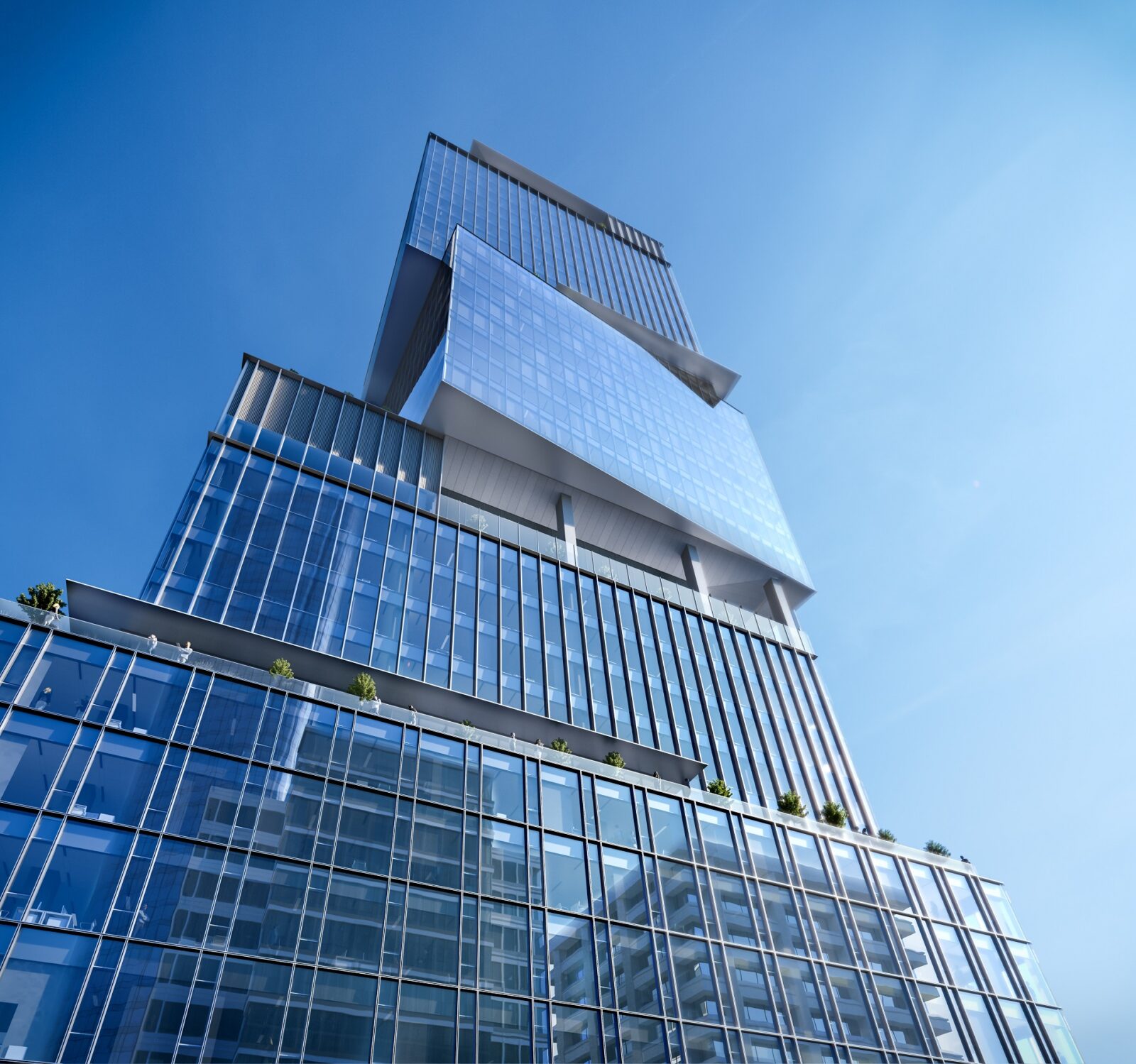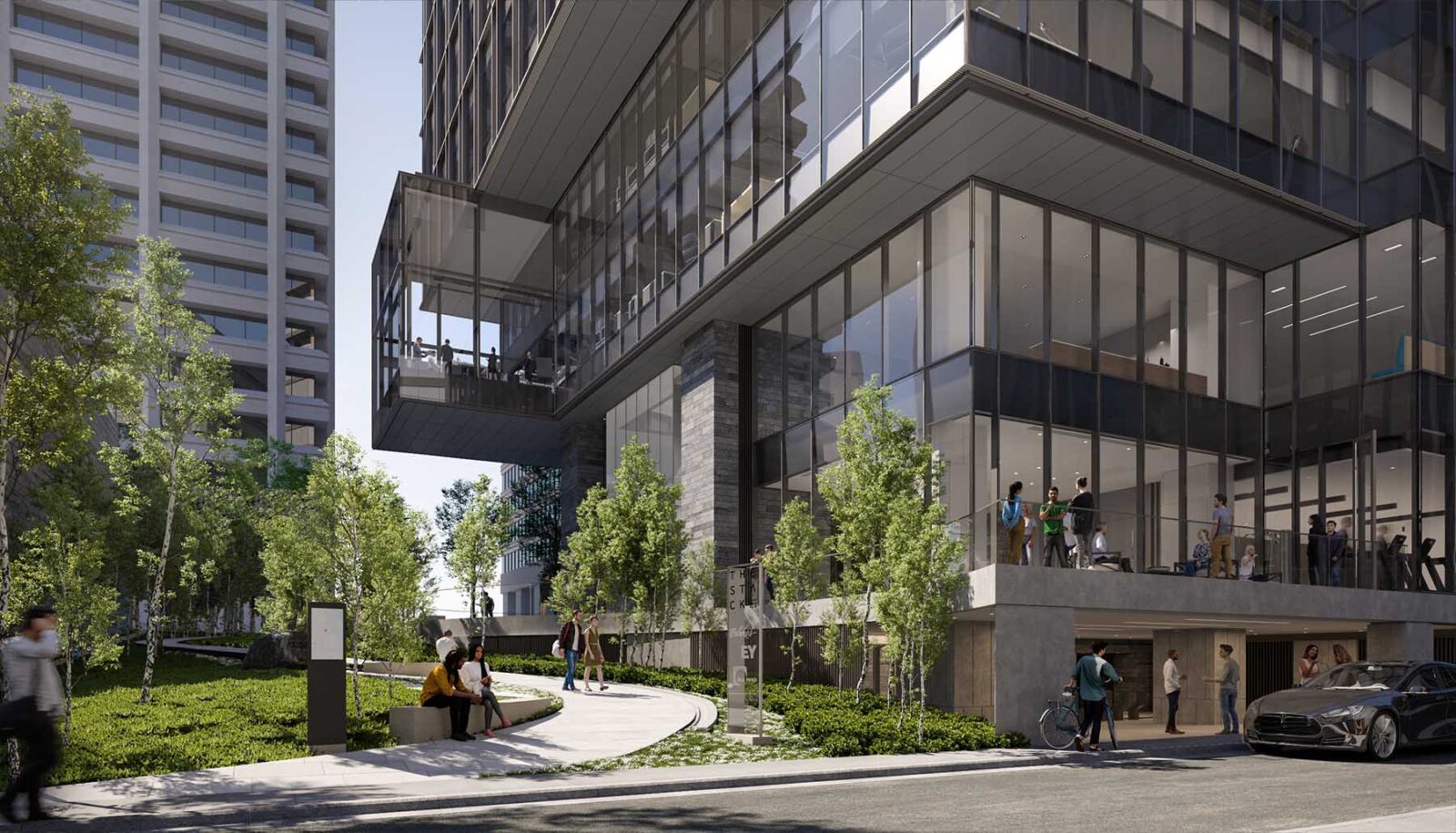Oxford ‘stacks’ up historic win for Vancouver office project
The project got the name from its unique design which resembles stacked boxes.

The Stack in downtown Vancouver is looking to set a new standard for sustainability. – Oxford Properties
Key Takeaways:
- The Stack, a 37-storey office tower, is officially a Zero Carbon Building.
- Oxford achieved this through low carbon building systems, triple-pane glazing on all windows, rainwater management and enhanced air tightness and other methods.
- Oxford says it wants to share its lessons from the project and encourage others in the industry to set high sustainability goals.
The Whole Story:
The Stack, a downtown Vancouver office tower, is making history.
The project’s developer, Oxford Properties Group, announced that The Stack, has achieved the Canada Green Building Council’s Zero Carbon Building – Design standard certification. The 37-storey, 550,000 sq. ft. commercial office tower is Canada’s first commercial high-rise office tower to achieve this certification.
As well as being the first high-rise commercial office tower to achieve the certification, it is also the largest project in Canada to achieve it to date. Upon completion later this year, The Stack is set to become the tallest office building in Vancouver.
The project team includes Ledcor and it was designed by James K.M. Cheng Architects.
Size created bigger challenges
Oxford noted that the project’s size added to the technical complexities required to achieve the Zero Carbon Standard. The project team stated that they incorporated many innovative features that minimize carbon emissions, energy and water usage as well as landfill waste. These include low carbon building systems, triple-pane glazing on all windows, rainwater management and enhanced air tightness. On-site renewable energy will be achieved through the use of a rooftop photovoltaic solar panel array.
“Oxford’s purpose is to create economic and social value through real estate and The Stack embodies Oxford’s ongoing commitment to sustainability and decarbonization,” said Andrew O’Neil, vice president of development for Oxford. “The CaGBC certification is the culmination of over five years of planning to pioneer a new zero carbon framework in a high-rise and architecturally-significant office tower, all while juggling the demands of realizing an economically-viable commercial project for our stakeholders.”

O’Neil added that the lessons learned from the project can now be applied to future projects, and shared with industry peers.
Oxford isn’t stopping there. The team is also targeting LEED v4 Platinum Core and Shell certification. Oxford plans to deploy smart building technology to provide insights on energy management, optimize building performance and enable preventative maintenance. The Stack will feature 250 bike parking stalls and club-quality fitness and change facilities for an exceptional customer experience. Oxford says this is meant to encourage wellness and promote sustainability.
Reducing total carbon footprint
The Stack is one part of a larger direction the company has been moving in. In 2015, Oxford set out to reduce its carbon footprint by 30 percent by 2025. Last year Oxford announced it had exceeded their goal, reducing its portfolio carbon intensity by 37 percent, four years ahead of schedule. Company officials explained that this was made possible by pioneering groundbreaking new developments that raise the bar on sustainability, investing in data and analytics to set hourly carbon targets for its properties and human solutions that encourage sustainable active transportation.
“Oxford continues to demonstrate leadership in lowering carbon emissions across their portfolio. The Stack is the first new high-rise office building to achieve CAGBC’s Zero Carbon Building – Design certification. With this stand out project, Oxford is setting a new benchmark for Canada’s top real estate owners,” said Thomas Mueller, president and CEO, Canada Green Building Council. “Shifting investor and market interests in carbon solutions, along with advances in technology and know-how, make it more feasible for Canada’s major real estate projects to follow suit.
Sustainability is good for business
The company noted that The Stack is set to become the latest in a line of landmark developments. These include Vancouver’s MNP Tower, 402 Dunsmuir and Riverbend Business Park, Manhattan’s St. John’s Terminal which was recently acquired by Google, The Leadenhall Building in London and Toronto’s Park Hyatt. The Stack is currently 70 per cent pre-leased.
“Oxford has strong conviction that best-in-class offices that are smart, wellness-focused and sustainable will continue to be highly desirable to occupiers and continue to outperform,” said Ted Mildon, senior director at Oxford. “There is a real need among businesses to ensure they are located in buildings that not only inspire and engage their workforce, but also actively contribute to their own ESG goals. As a result of our Zero Carbon certification, The Stack is uniquely positioned to do so in the Vancouver market.”

